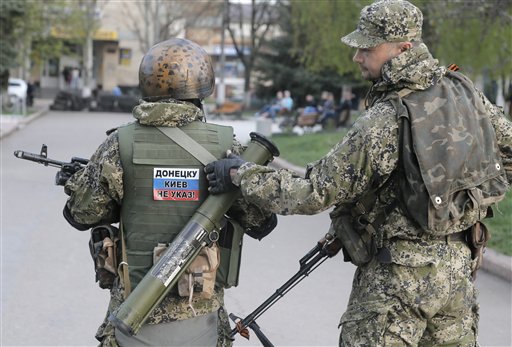G7 to impose new sanctions on Russia as Kiev warns of ‘world war’

Pro-Russian gunman patrol a streets in downtown Slovyansk, Eastern Ukraine, Friday, April 18, 2014. AP
SLAVYANSK—The Group of Seven rich countries agreed Saturday to impose new sanctions on Russia over the crisis in Ukraine, after Kiev accused Moscow of seeking to trigger a “third world war”.
The G7 nations, in a joint statement, said they would “move swiftly to impose additional sanctions on Russia,” with a senior US official saying they could come as early as Monday.
The G7 statement praised the “restraint” with which the new government in Kiev had acted in dealing with the pro-Russian gunmen who have seized official buildings in the east of Ukraine.
Earlier German Chancellor Angela Merkel said EU foreign ministers would meet soon to discuss the issue after speaking by conference call with US President Barack Obama, British Prime Minister David Cameron, French President Francois Hollande and Italian Prime Minister Matteo Renzi.
The G7 also includes Canada and Japan.
Article continues after this advertisementMeanwhile, Ukrainian authorities ratcheted up military operations against pro-Russian rebels in the east and their Cold War-style rhetoric.
Article continues after this advertisement‘The World hasn’t forgotten’
The world hasn’t forgotten the Second World War and Russia wants to start a third world war,” Ukrainian Prime Minister Arseniy Yatsenyuk said.
“Russia’s support for the terrorists in Ukraine constitutes an international crime and we call on the international community to unite against the Russian aggression.”
A Western diplomat voiced concern of a possible Russian move into eastern Ukraine in the coming days, maybe even over the weekend.
“We no longer exclude a Russian military intervention in Ukraine in the coming days,” the diplomatic source said, noting that Russia’s UN envoy Vitaly Churkin “has been recalled urgently to Moscow” for consultations.
Tensions were further heightened on the ground as the Ukrainian military launched a new offensive to besiege the rebel-held city of Slavyansk and insurgents blew up an army helicopter with a rocket-propelled grenade.
At the entrance to Slavyansk, several members of an OSCE observer mission were detained and taken to the rebel-held security services building, sparking immediate international condemnation.
German Defence Minister Ursula von der Leyen said pro-Russian separatists arrested 13 mission members, including three members of the German army and an interpreter.
Washington called for the immediate release of the OSCE team and
State Department spokeswoman Jen Psaki insisted “there is a strong connection between Russia and these separatists,” carrying out such hostage-takings
The United States and the European Union have already targeted Russian President Vladimir Putin’s inner circle with visa and asset freezes and imposed sanctions on a key Russian bank.
Western leaders have repeatedly threatened to hit Russia with measures aimed at the wider economy.
However Obama has signalled the new sanctions will not involve an attempt to target key areas of the Russian economy such as mining, energy and the financial sectors.
US officials have said those measures would only be considered if Russia sends its regular forces across the border into eastern Ukraine.
‘We will not surrender’
The White House said that Moscow could “still choose a peaceful resolution to the crisis” by implementing a deal struck in Geneva last week to defuse the tension.
Ukraine’s Deputy Foreign Minister Danylo Lubkivsky told reporters at the United Nations that his country would exercise restraint in its operations against pro-Russian separatists.
“The anti-terrorist operation is ongoing, but we are guided by one major idea: we would like to avoid any victims or casualties,” he said.
Kiev announced that its forces were now seeking to “blockade” rebels inside Slavyansk, in a bid to prevent militant reinforcements from arriving and to spare civilian casualties.
An AFP journalist saw heavily armed troops setting up a checkpoint some 15 kilometres (10 miles) from the town of 110,000 people.
On Thursday, Ukrainian armoured vehicles and commandos had made a brief but dramatic incursion into Slavyansk, killing a 22-year-old insurgent.
But the rebels in Slavyansk were defiant Friday, vowing: “We will not surrender the town.”
Only 16 kilometres to the south, at an air base close to the city of Kramatorsk, a rocket-propelled grenade blew up a Ukrainian military helicopter sitting on the tarmac, officials in Kiev said.
The pilot escaped but was wounded.
Russia responded to Ukraine’s military offensive by ordering its troops massed on the border to launch new drills.
Russian Foreign Minister Sergei Lavrov claimed Kiev’s offensive was part of a US plot to “seize” Ukraine for its own “geopolitical ambitions and not the interests of the Ukrainian people”.
In a sign of the increasingly desperate efforts to prevent the conflict spiralling out of control, German Foreign Minister Frank-Walter Steinmeier warned: “There is not much time to end this madness.”
‘An expensive mistake’
With the threat of sanctions hanging over Russia’s already shaky economy, ratings agency Standard and Poor’s on Friday downgraded its credit rating to one notch above junk status.
Russia’s central bank reacted by raising its key interest rate in a bid to offset “growing inflationary risks”.
US Secretary of State John Kerry had warned earlier that Russia could be making “an expensive mistake” in Ukraine.
While Obama has ruled out sending US or NATO forces into Ukraine, Washington has begun deploying 600 US troops to bolster NATO’s defences in nearby eastern European states.
France also said it was sending four fighter jets to join NATO air patrols over the Baltic states.
Yulia Tymoshenko, a former prime minister who is a frontrunner for the May 25 election, publicly warned Putin that if he starts a war, it “will be the end of your regime”.
“We shall win and your people will answer for all the crimes,” she said on her official website.